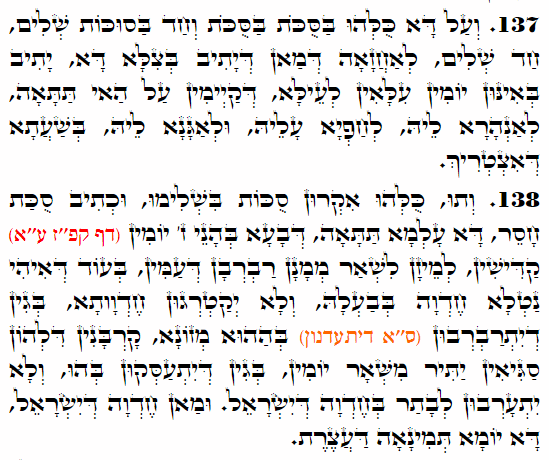Daily Zohar # 4486 – Tetzaveh – Sukkah, nourishments for all
Daily Zohar 4486

Hebrew translation:
138. וְעוֹד, כֻּלָּם נִקְרָאִים סֻכּוֹת בִּשְׁלֵמוּת, וְכָתוּב סֻכֹּת חָסֵר, זֶה הָעוֹלָם הַתַּחְתּוֹן שֶׁצָּרִיךְ בְּאֵלּוּ הַשִּׁבְעָה יָמִים קְדוֹשִׁים לָזוּן לִשְׁאָר הַמְמֻנִּים הַגְּדוֹלִים שֶׁל הָעַמִּים, בְּשָׁעָה שֶׁהִיא לוֹקַחַת שִׂמְחָה בְּבַעְלָהּ, וְלֹא יְקַלְקְלוּ שִׂמְחָתָהּ, כְּדֵי שֶׁיִּתְבַּלְבְּלוּ (שֶׁיִּתְעַדְּנוּ) בַּמָּזוֹן הַהוּא, הַקָּרְבָּנוֹת שֶׁלָּהֶם רַבִּים יוֹתֵר מִשְּׁאָר יָמִים, כְּדֵי שֶׁיִּתְעַסְּקוּ בָהֶם וְלֹא יִתְעָרְבוּ לְבַסּוֹף בַּשִּׂמְחָה שֶׁל יִשְׂרָאֵל. וּמִי הִיא שִׂמְחָה שֶׁל יִשְׂרָאֵל? זֶה יוֹם שְׁמִינִי עֲצֶרֶת.
.
Zohar Tetzaveh
Continued from previous DZ
#137
In all instances, it is written “סֻכַּת” “Sukkah” without a “vav,” indicating Malchut as mentioned above, and in one place, it is written (Leviticus 23:43) “בַסֻּכּוֹת” “in Sukkot,” fully spelled. The one spelled in full is to show that whoever dwells in the shadow of the Sukkah dwells in these upper days above, namely Chessed, Gevurah, Tiferet, Netzach, Hod, Yessod, and Malchut of Binah. Their light comes over Malchut and illuminates it because the thatch (סְכָך) of the Sukkah is from Binah to protect Malchut at times when it is needed.
#138
Furthermore, it can be said that in all places, it is called “Sukkot” with the complete spelling, meaning the thatch (סְכָך) of Binah and the thatch of Zeir Anpin. “Sukkah” without a “vav” refers to the lower world, Malchut. During these seven holy days, it is necessary to nourish the ministers of the seventy nations, which corresponds to the seventy bulls sacrificed during the seven days of Sukkot. While the other nations enjoy the nourishments from the Left of Malchut, Malchut receives joy from its unification, with her husband receiving from his Mochin. This is necessary to ensure that the other nations won’t bring judgment on Israel during their time of joy. The sacrifices given to them are more than on other days so that they will be occupied with them and not interfere afterward with the joy of Israel. This is akin to giving them a portion in the goat sacrifice of Rosh Chodesh and the Azazel goat of Yom Kippur. The day of joy for Israel is the Eighth Day of the holiday, Shemini Atzeret.
{||}

 Previous: Tetzaveh
Previous: Tetzaveh
